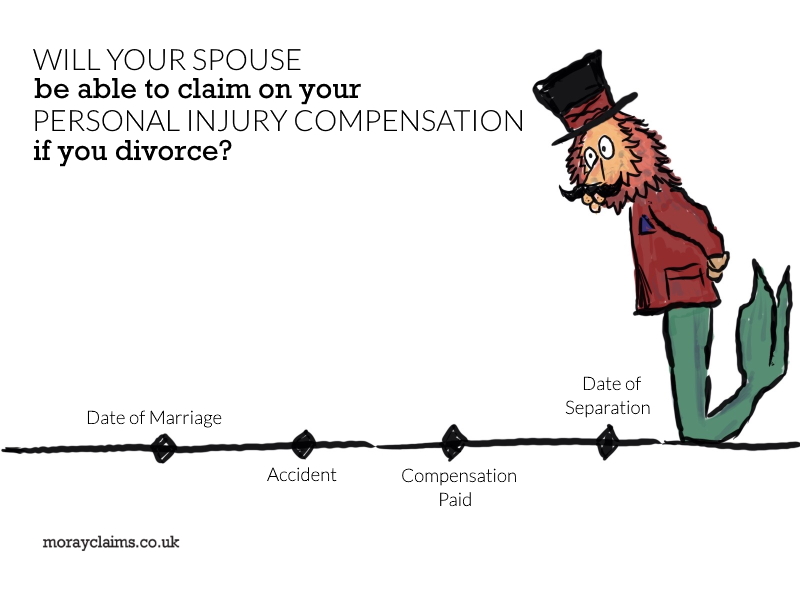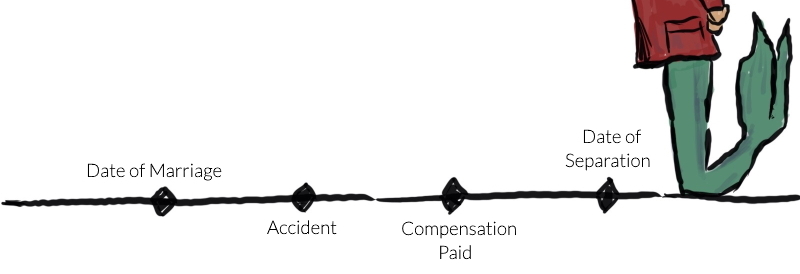
Personal injury claims come with stress attached.
You have the strain of the pain and discomfort from the injury, the hassle of not being able to engage in everyday activities and possibly also the worry of loss of income through not being able to work.
Coping with injury puts added pressure on your relationships.
Particularly your closest relationships.
This can lead to relationship breakdowns, whether that is splitting up with your boyfriend or girlfriend, or separating from your spouse or civil partner.
Even the strongest relationships can be undermined.
Personal injuries can be physical or mental, or both.
As an injured person, you may develop depressive symptoms or changes in personality.
In this article, we are going to look at what Scots law says about personal injury compensation in the context of relationship breakdown.
We will focus particularly on financial provision on divorce or termination of civil partnership. We’ll look at the situation where one partner has been injured and has received (or may in the future receive) personal injury compensation and whether and to what extent the other partner might have a claim on that compensation.
When a relationship such as marriage or civil partnership breaks down, various issues arise:
- Do the couple want a formal end to their relationship (e.g. divorce)?
- Are there any children of the relationship and how will their welfare be protected if the parents are living separately (issues of residence and contact)?
- Will one partner need financial support from the other in the meantime to be able to survive and adjust to separated life (issues of aliment)?
- And how will the couple’s capital assets (and their debts) be shared fairly between them so they can have, as far as possible, a “clean break” from each other and begin to set about progressing their separate lives into the future?
Personal injury compensation usually comes up in the context of “division of capital assets”.
For the purposes of the rest of this article, we will talk in terms of a marriage between husband and wife. However, the same principles apply to civil partnership.
We’ll now go on to consider three issues in relation to personal injury compensation and divorce. Firstly, how does Scots Law determine whether personal injury compensation forms matrimonial property which has to be taken into account when a couple’s assets are being divided on termination of their relationship? Secondly, what is a practical example of the type of situation which can arise? And, thirdly, is the whole of an award of compensation taken into account or only some of it?
1. How do you tell if personal injury compensation forms part of a couple’s matrimonial property?
A general principle of division of matrimonial property is that it applies to all property the couple have acquired – whether jointly or individually – between the date when they got married and the date when they separated.
A certificate will prove when they got married and usually there will be agreement, more or less, about the date when they separated.
Compensation received by either spouse between the date of marriage and the date of separation, as the result of a personal injury claim, will form matrimonial property.
2. What’s a practical example of financial provision on divorce in the context of personal injury compensation?
The best way to get a handle on practical issues which can arise as to consider the case of Skarpaas from 1991.
Mr and Mrs Skarpaas were married at Aberdeen on 06 August 1984. Mr Skarpaas was injured in an industrial accident on 01 December 1984. His injuries meant that he did not work again during the course of the marriage.
He raised an action for personal injury compensation against his employers in Aberdeen Sheriff Court.
The couple separated on 28 July 1988, at which time the personal injury claim had not yet ended.
Mr Skarpaas was awarded personal injury compensation totalling £105,528.89 and he received payment on 08 August 1989. The date of the parties’ divorce was about 6 months later, on 29 March 1990.
The date of divorce was the point when the court was determining how the personal injury compensation should be taken into account when calculating division of matrimonial property and Mr Skarpaas had received his compensation by then. It seems to be the case that whatever was left of the compensation was the only capital asset Mr Skarpaas had by the time of divorce.
The divorce action in Skarpaas went through 2 stages of appeals but we can take the following points from it:
(a) Mr Skarpaas was injured between the date of marriage and the date he separated from his wife.
(b) Mr Skarpaas’s right to property (the right to claim personal injury compensation) arose at the point when the accident occurred.
(c) Mr Skarpaas had received his compensation before the date of separation from his wife.
Taking all of these factors into account, the personal injury compensation was “matrimonial property”.
On the face of it, Mrs Skarpaas had a claim to a share in it.
It was quite easy to say that much in this case because Mr Skarpaas was both injured and compensated between the date of marriage and date of separation.
The court in Skarpaas decided that the net matrimonial property to be shared fairly between Mr and Mrs Skarpaas was £46,255.
Mrs Skarpaas was awarded £25,000, so she received more than 50% of the net matrimonial property.
Of course, Mr Skarpaas’s personal injury compensation had amounted to £105,528.89 so, in relation to that figure, Mrs Skarpaas received less than 25%. How did that work?
We can go on to discuss this in part three of this article now.
3. Is the whole of an award of personal injury compensation taken into account or only some of it?
The short answer is that not all of an award of personal injury compensation will form matrimonial property.
The longer answer is that there is a range of factors which can reduce the amount of the compensation which will be taken to form part of the matrimonial property.
A personal injury claim usually includes a few fairly standard elements (for example):
- Solatium (claim for the pain and suffering associated with the injuries);
- Wage loss (this could be for wage loss into the future as well as for the past);
- Services (a claim by relatives of the injured person – e.g. their spouse – for nursing-type services provided to the injured person).
Returning to the Skarpaas case, the court took the view that some parts of the claim should not form part of the matrimonial property.
The solatium element of the claim (in this case, about £10,000) was discounted because the “pain and suffering” was personal to the injured person.
Also, a claim for loss of future earning capacity was deducted from the matrimonial property because this represented a loss of funds which the non-injured spouse – Mrs Skarpaas – would not have been entitled to following the breakdown of the marriage.
Through the deduction of these and other amounts, that is how the court got the total matrimonial property down to as “low” a figure as £46,255 before then deciding how it should be split between Mr and Mrs Skarpaas.
Many personal injury claims settle on a “global” figure for compensation.
The values given to the individual elements of the claim are not specified.
It means you might need to provide other evidence about how much to attribute to solatium, wage loss and so on. A schedule of damages lodged in the court action – if there has been one – or counsel’s opinion on quantum, are possible options.
Summary
The basic purpose of financial provision on divorce is to share fairly what the couple have acquired individually and collectively while they were married and living together.
If one spouse gets injured after the marriage and before the separation, their personal injury compensation will be “up for grabs” in financial provision terms.
It’s been beyond the scope of this article to consider situations where, say, a person gets injured before the date of marriage but their compensation is paid out after marriage and before separation; or where the injury happens while the couple are married and living together but the compensation is only paid after they are divorced.

The sequence of events in Figure 1 above is probably the “simplest” legally because (a) the accident happened between date of marriage and date of separation, and so the “property” acquired (the right to compensation) is clearly matrimonial property, and (b) the compensation has been received before date of separation so it will be “easier” to work out what value to include for matrimonial property purposes.
But the variable interplay between the personal injry dates and the family law dates emphasises the need to get specialist legal advice where a compensation payment – especially a substantial one – is potentially part of the matrimonial property.
And that’s before you take into account that, even if the compensation is in principle hooked into matrimonial property, parts of it will almost certainly be excluded for various reasons and you need someone knowledgeable to look after your interests to make sure that the compensation is analysed fairly for matrimonial property purposes.
The Skarpaas total compensation of over £100,000 coming down to under £50,000 as “matrimonial property” and the non-injured spouse receiving more than 50% of the matrimonial property was justifiable according to the legal principles involved. But it’s not a simple arithmetical exercise. It’s not easy to get it right without legal help.
A way to think about it is whether you consider that any of the claimed compensation would be due to compensate losses (especially wage loss) which occurred between the date of marriage and the date of separation. If that’s so – while it’s no guarantee it will be included – you should have it on your financial provision radar and make sure you tell your family law solicitor about it.
How we can help
In this article, we’ve looked at personal injury compensation and divorce, and all the ways that compensation could be affected by the law on financial provision on divorce.
Should you have any further questions about anything mentioned in this article, please get in touch with us. All initial enquiries are free of charge and without obligation.
We are always keen to extend the content on this website, so questions are always welcomed. They allow us to answer them by revamping existing content or creating new material.
Have a look at the article HERE, if you want to understand more about how we will deal with things if you get in touch with us about making a personal injury compensation claim.
Phone either of our accredited specialist personal injury solicitors (Marie and Peter) on 01343 544077 or send us a Free Online Enquiry.